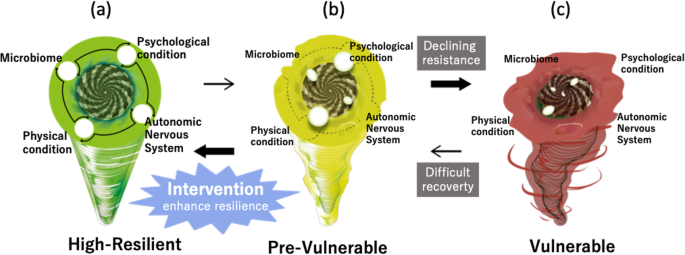💡 The escalating rates of mental health challenges among mothers, exacerbated by the ongoing COVID-19 pandemic, necessitate a comprehensive exploration of factors contributing to resilience. This study investigates the intricate relationships between intestinal microbiota, physical well-being, and psychological states in Japanese mothers without psychiatric or physical disorders. Two studies were conducted to explore the risk of parenting stress and psychological resilience, shedding light on the impact of three key factors: intestinal microbiota, autonomic nervous system function, and physical condition.
📍 Study 1 – Parenting Stress Risk:
In Study 1, researchers focused on the relationship between parenting stress risk and the intestinal microbiota in a substantial sample of Japanese mothers caring for children aged 0–4 years. Approximately 19% of mothers exhibited high parenting stress risk, despite the absence of clinical psychiatric or physical illnesses. Mothers in the high parenting stress risk group displayed compromised sleep quality and physical condition, including hormonal imbalance, poor digestive function, and blood circulation. Microbiome analysis revealed a lower Shannon α diversity in the high-risk group, along with significant differences in β diversity. Notable features included abnormal levels of SCFA-producing bacteria, reduced immunity-related bacteria, and an increase in inflammatory microbiota. This dysbiosis, particularly in butyrate-producing bacteria like 𝘓𝘢𝘤𝘩𝘯𝘰𝘴𝘱𝘪𝘳𝘢, suggested a vulnerable state in the intestinal environment.
📍 Study 2 – Resilience in Primiparous Mothers:
Study 2 focused on primiparous mothers within 6 months postpartum, aiming to uncover factors contributing to physical and psychological resilience. Vagal nerve activity positively correlated with both intestinal microbiota diversity (Shannon α) and psychological resilience (J-RS). Certain bacterial genera, such as 𝘉𝘭𝘢𝘶𝘵𝘪𝘢 𝘚𝘊05𝘉48, 𝘊𝘭𝘰𝘴𝘵𝘳𝘪𝘥𝘪𝘶𝘮 𝘚𝘠8519, 𝘊𝘰𝘭𝘭𝘪𝘯𝘴𝘦𝘭𝘭𝘢 𝘢𝘦𝘳𝘰𝘧𝘢𝘤𝘪𝘦𝘯𝘴, 𝘢𝘯𝘥 𝘌𝘨𝘨𝘦𝘳𝘵𝘩𝘦𝘭𝘭𝘢 𝘭𝘦𝘯𝘵𝘢, exhibited associations with individual differences in both psychological resilience and physical functions. Notably, 𝘌𝘨𝘨𝘦𝘳𝘵𝘩𝘦𝘭𝘭𝘢 𝘭𝘦𝘯𝘵𝘢, known for its ability to metabolize isoflavones to produce equol, correlated with increased parenting stress and reduced resilience. 𝘊𝘭𝘰𝘴𝘵𝘳𝘪𝘥𝘪𝘶𝘮 𝘚𝘠8519, associated with immune regulation, displayed positive correlations with psychological resilience but negative associations with oxytocin, suggesting a complex interplay.
📍 Key Findings:
📌 Microbial Diversity and Stress Risk: High parenting stress risk was linked to reduced alpha and beta diversity in the microbiome, indicating a dysregulated gut environment.
📌 SCFA-Producing Bacteria and Stress: Abnormal levels of SCFA-producing bacteria, including 𝘓𝘢𝘤𝘩𝘯𝘰𝘴𝘱𝘪𝘳𝘢, were associated with parenting stress, aligning with findings in depression studies.
📌 Inflammation and Immunity: Mothers at high stress risk exhibited more inflammatory microbiota and fewer bacteria related to immunity and antibiotic effects, emphasizing the role of dysbiosis in stress.
📌 Vagal Nerve Activity and Resilience: Vagal nerve activity emerged as a positive correlate of both microbiota diversity and psychological resilience, offering insights into potential biomarkers.
📌 Specific Bacterial Genera and Resilience: 𝘉𝘭𝘢𝘶𝘵𝘪𝘢, 𝘊𝘭𝘰𝘴𝘵𝘳𝘪𝘥𝘪𝘶𝘮, 𝘊𝘰𝘭𝘭𝘪𝘯𝘴𝘦𝘭𝘭𝘢 𝘢𝘦𝘳𝘰𝘧𝘢𝘤𝘪𝘦𝘯𝘴, 𝘢𝘯𝘥 𝘌𝘨𝘨𝘦𝘳𝘵𝘩𝘦𝘭𝘭𝘢 𝘭𝘦𝘯𝘵𝘢 showed associations with psychological resilience and physical functions in primiparous mothers.
📌 Oxytocin and Immune Regulation: 𝘊𝘭𝘰𝘴𝘵𝘳𝘪𝘥𝘪𝘶𝘮 𝘚𝘠8519 displayed conflicting associations with oxytocin and psychological resilience, suggesting a potential role in immune regulation during stress.
📍 In conclusion, this study unveils the intricate connections between the microbiota-gut-brain axis, parenting stress risk, and resilience in Japanese mothers. Dysbiosis in the intestinal microbiota emerged as a vulnerability factor in high-stress situations, emphasizing the importance of screening for stress risk. The positive correlation between vagal nerve activity and resilience highlights a potential biomarker for psychological well-being.
Link to the study : http://tinyurl.com/33bkhca6
